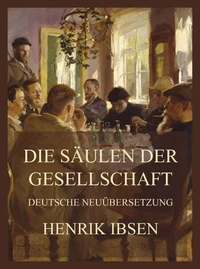Pillars of Society
Par : ,Formats :
Disponible dans votre compte client Decitre ou Furet du Nord dès validation de votre commande. Le format ePub est :
- Compatible avec une lecture sur My Vivlio (smartphone, tablette, ordinateur)
- Compatible avec une lecture sur liseuses Vivlio
- Pour les liseuses autres que Vivlio, vous devez utiliser le logiciel Adobe Digital Edition. Non compatible avec la lecture sur les liseuses Kindle, Remarkable et Sony
 , qui est-ce ?
, qui est-ce ?Notre partenaire de plateforme de lecture numérique où vous retrouverez l'ensemble de vos ebooks gratuitement
Pour en savoir plus sur nos ebooks, consultez notre aide en ligne ici
- Nombre de pages78
- FormatePub
- ISBN859-65--4736829-8
- EAN8596547368298
- Date de parution16/09/2022
- Protection num.Digital Watermarking
- Taille381 Ko
- Infos supplémentairesepub
- ÉditeurDIGICAT
Résumé
In "Pillars of Society, " Henrik Ibsen crafts a poignant critique of moral hypocrisy within 19th-century Norwegian society, exposing the discord between personal integrity and societal expectations. Through a rich tapestry of dialogue and complex character interactions, Ibsen employs realism to narrate the plight of several characters entangled in a web of deceit, ambition, and betrayal. Central to this exploration is the character of Bernick, whose facade of respectability masks a deep-seated moral crisis, set against the backdrop of industrial progress and the evolving social landscape.
Henrik Ibsen, often referred to as the father of modern drama, drew from his own experiences within a society fraught with rigid social structures and ethical dilemmas. Born in Skien, Norway, his early life was marked by economic hardship, which shaped his keen understanding of human nature and social conflict. These influences permeated his work, infusing his plays with a critical perspective on the prescribed roles within society and the individual's quest for authenticity amidst oppressive norms.
"Pillars of Society" is a must-read for those fascinated by the interplay of personal ethics and societal constraints. Ibsen's insights remain strikingly relevant today, rendering this work not just a historical artifact, but a powerful commentary on ongoing social dilemmas. Readers seeking a profound narrative that challenges societal conventions will find Ibsen's masterpiece both enlightening and provocatively engaging.
Henrik Ibsen, often referred to as the father of modern drama, drew from his own experiences within a society fraught with rigid social structures and ethical dilemmas. Born in Skien, Norway, his early life was marked by economic hardship, which shaped his keen understanding of human nature and social conflict. These influences permeated his work, infusing his plays with a critical perspective on the prescribed roles within society and the individual's quest for authenticity amidst oppressive norms.
"Pillars of Society" is a must-read for those fascinated by the interplay of personal ethics and societal constraints. Ibsen's insights remain strikingly relevant today, rendering this work not just a historical artifact, but a powerful commentary on ongoing social dilemmas. Readers seeking a profound narrative that challenges societal conventions will find Ibsen's masterpiece both enlightening and provocatively engaging.
In "Pillars of Society, " Henrik Ibsen crafts a poignant critique of moral hypocrisy within 19th-century Norwegian society, exposing the discord between personal integrity and societal expectations. Through a rich tapestry of dialogue and complex character interactions, Ibsen employs realism to narrate the plight of several characters entangled in a web of deceit, ambition, and betrayal. Central to this exploration is the character of Bernick, whose facade of respectability masks a deep-seated moral crisis, set against the backdrop of industrial progress and the evolving social landscape.
Henrik Ibsen, often referred to as the father of modern drama, drew from his own experiences within a society fraught with rigid social structures and ethical dilemmas. Born in Skien, Norway, his early life was marked by economic hardship, which shaped his keen understanding of human nature and social conflict. These influences permeated his work, infusing his plays with a critical perspective on the prescribed roles within society and the individual's quest for authenticity amidst oppressive norms.
"Pillars of Society" is a must-read for those fascinated by the interplay of personal ethics and societal constraints. Ibsen's insights remain strikingly relevant today, rendering this work not just a historical artifact, but a powerful commentary on ongoing social dilemmas. Readers seeking a profound narrative that challenges societal conventions will find Ibsen's masterpiece both enlightening and provocatively engaging.
Henrik Ibsen, often referred to as the father of modern drama, drew from his own experiences within a society fraught with rigid social structures and ethical dilemmas. Born in Skien, Norway, his early life was marked by economic hardship, which shaped his keen understanding of human nature and social conflict. These influences permeated his work, infusing his plays with a critical perspective on the prescribed roles within society and the individual's quest for authenticity amidst oppressive norms.
"Pillars of Society" is a must-read for those fascinated by the interplay of personal ethics and societal constraints. Ibsen's insights remain strikingly relevant today, rendering this work not just a historical artifact, but a powerful commentary on ongoing social dilemmas. Readers seeking a profound narrative that challenges societal conventions will find Ibsen's masterpiece both enlightening and provocatively engaging.










